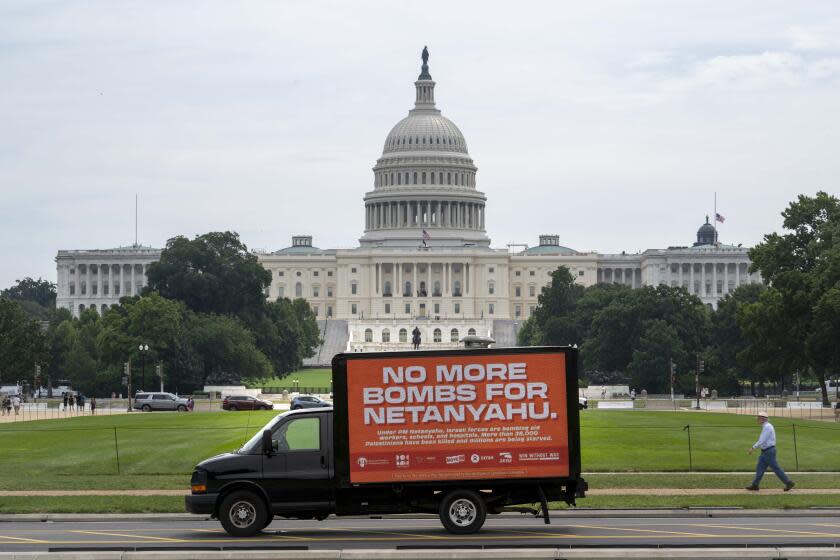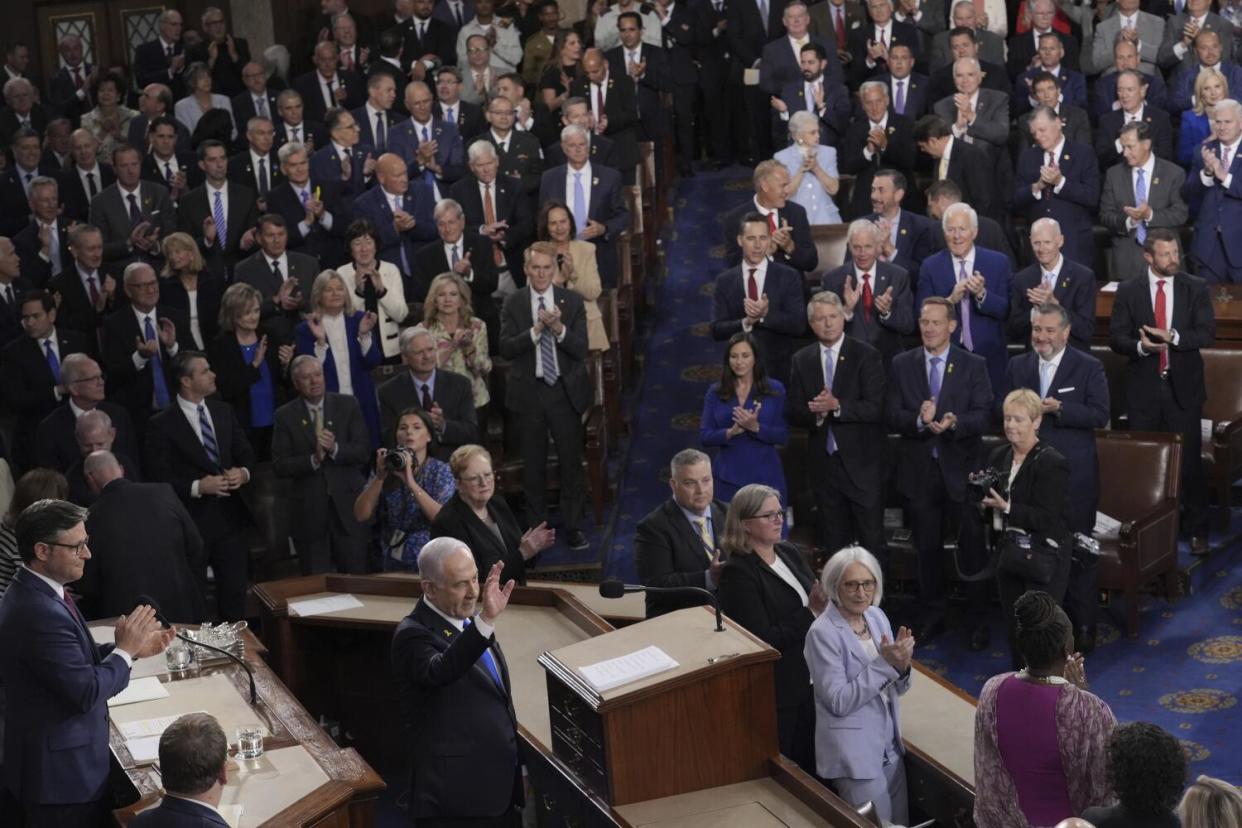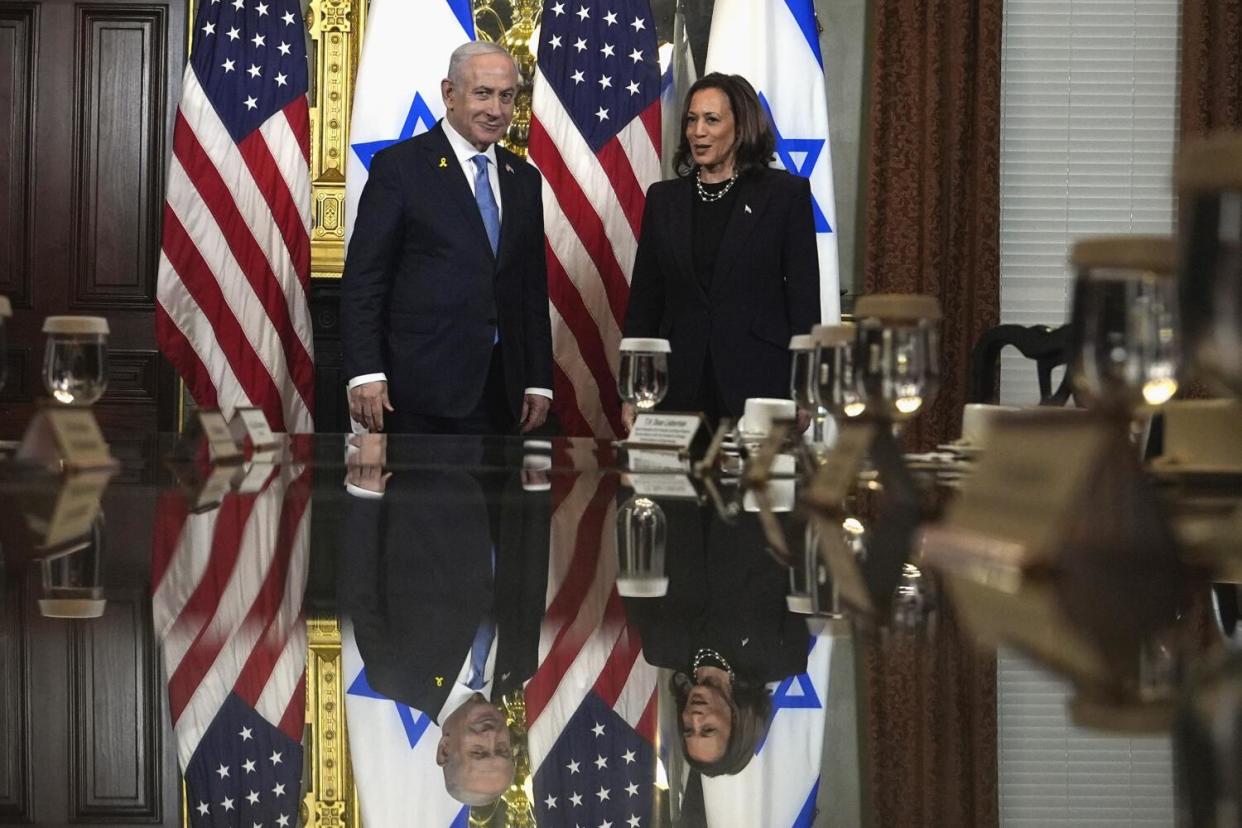Netanyahu's high-profile U.S. visit derailed by shifting politics here and at home

Embattled Israeli Prime Minister Benjamin Netanyahu wrapped up a weeklong U.S. trip Friday with a pilgrimage to Mar-a-Lago, tipping his hat to Republican presidential nominee Donald Trump, after stops at the two citadels of U.S. power: the White House and the Capitol.
Netanyahu intended his U.S. visit to be a triumphant lap that would show people back home, especially his political base, that he still enjoyed unconditional U.S. support.
What he received instead was more complicated, reflecting divisions and political uncertainty here, and growing opposition, even among some U.S. officials, to the way Netanyahu is conducting the Gaza war, about to enter its 11th month.
In separate private meetings with President Biden and Vice President Kamala Harris on Thursday, Netanyahu heard some of the toughest talk yet on the urgent need to accept a cease-fire in Israel’s war in Gaza, according to U.S. officials.
Read more:In fiery speech to Congress, Netanyahu defends war in Gaza and denounces protesters
At the Capitol on Wednesday, he became the first foreign leader afforded the honor of making a fourth speech to a joint session of Congress, where he demanded help to keep fighting the war. But the reception was notably cooler than in past visits. The standing ovations were only partial. More than 50 Democratic lawmakers boycotted or were otherwise absent. And Palestinian American Rep. Rashida Tlaib (D-Mich.) held up a sign that read “war criminal” on one side and “guilty of genocide” on the other.

At Trump’s Florida resort, Netanyahu was more interested in repairing damage in his once mutually fawning relationship with the man he hopes will once again be president. As president, Trump had given Netanyahu everything he asked for. But Trump turned on Netanyahu when the Israeli leader recognized Biden’s electoral victory over Trump in 2020.
But Friday it seemed all had been forgiven. Trump greeted Netanyahu as he arrived at Mar-a-Lago, smiling broadly and with an enthusiastic handshake. Before they sat to talk, Netanyahu gifted Trump a framed photo of a child he said had been captured by Hamas, the Associated Press reported. “We’ll get it taken care of,” Trump said.
In addition to pledging several times that he would be able to resolve the Gaza crisis quickly, without saying how, Trump had harsh descriptions of Harris, telling Netanyahu she was “worse than” Biden and had been “disrespectful” to Israel by raising the plight of Palestinians.
A key goal for Netanyahu was to court the Republican Party, with which he is confident he would have more leverage. While most previous Israeli leaders have strenuously avoided taking sides in U.S. partisan fights, Netanyahu has long allied himself more closely with the GOP.
Just weeks ago Trump and the Republican Party appeared ascendant. But the upheaval this week that appears to have brought Harris to the head of the Democratic presidential ticket scrambled those calculations.

In his speech to Congress, the Israeli leader praised Biden, who announced Sunday he would not run again. Netanyahu praised Trump in even more glowing terms — and did not mention Harris by name.
Palestinian Hamas militants based in Gaza attacked southern Israel on Oct. 7, killing nearly 1,200 Israelis and seizing several hundred hostages. The massacre triggered a punishing retaliatory war by Israel, which has pounded the narrow seaside enclave and killed more than 39,000 Palestinians, including vast numbers of civilians, according to Palestinian officials. Israel has blocked most food and medical aid, fueling a humanitarian crisis.
Here in Washington, Netanyahu could not escape the massive demonstrations that have dogged him in Tel Aviv and Jerusalem. Thousands of protesters lined his motorcade route each day and held rallies outside the Capitol and on the National Mall.
In his address to Congress — a largely dark speech vowing absolute victory in Gaza — Netanyahu dismissed U.S. protesters as “useful idiots” acting on behalf of Israel’s enemies.
Despite strains in the relationship with a pro-Israel Biden, the president welcomed the prime minister warmly to their meeting at the White House.
Harris declared herself a lasting friend of Israel, but was more pointed in criticizing the “devastating” toll of death and destruction among Palestinian civilians in Gaza.
“I will not be silent,” she said after her meeting with Netanyahu. “The images of dead children and desperate, hungry people fleeing for safety, sometimes displaced for the second, third or fourth time. … We cannot look away in the face of these tragedies. We cannot allow ourselves to become numb to the suffering.”
Read more:Israel is spying on Hezbollah commanders — and killing them one by one
It remains to be seen how Harris would refocus U.S. Middle East policy in contrast to Biden. The Israeli-Palestinian question is a tightrope for Harris: She wants to assert her sympathy for Israel while distancing herself from Biden’s unstinting embrace of a country finding itself under heavy reproach from many Americans.
Administration officials who work with Biden and Harris say that there is “no daylight” between the two leaders on Israeli-Palestinian policy, but that there is a perception of difference, perhaps because Harris was more outspoken from the start about Palestinian casualties.
Both Biden and Harris, in their meetings with Netanyahu, pressed him on a cease-fire proposal now on the table — of which Netanyahu made no mention in his speech. The deal would also free most hostages and surge aid to starving Palestinians in Gaza. It has been negotiated for months, by Washington, Qatar and Egypt. U.S. officials say both Hamas and Israel at one time or another have delayed a final agreement.

Biden and Harris urged Netanyahu to move to close the “final gaps,” which include timing on the negotiation of a permanent cease-fire and withdrawal from Gaza of Israeli troops.
Netanyahu, in public remarks during his trip, has also not mentioned the creation of an independent Palestinian state, which the U.S., regional powerhouse Saudi Arabia and many others consider critical to an enduring end of the Gaza war and broader pacification of the Middle East. To the contrary, he led a first-ever vote last week in the Israeli Knesset, or parliament, to formalize an official opposition to the creation of a Palestinian state.
Many critics, including a large number within Israel, said that Netanyahu, by taking such positions, is slow-walking any cease-fire agreement, even if it means sacrificing the hostages, as a way to protect his own political interests. The most radical members of his extremist right-wing government have threatened to tumble Netanyahu’s government if he makes any concessions before the complete annihilation of Hamas, a near-impossible feat.
“For all of his unwavering defense of Israel, it falls flat for too many,” Michael Koplow, chief policy officer for the Israel Policy Forum, a U.S.-based analytical group, wrote in a weekly column appearing Friday, “both because of problems of Netanyahu’s own creation and his omnipresent choice to elevate his own political security before the fundamental security of Israel.”
Koplow added: “Netanyahu wins, Israel loses.”
Read more:Barack and Michelle Obama endorse Harris: 'She gives us all reason to hope'
Israelis who traveled to Washington to protest against Netanyahu, including relatives of Israelis and Americans still being held hostage by Hamas, said many members of Congress and others in the U.S. fail to grasp how unpopular the prime minister is at home.
“Before Oct. 7, the question was, ‘Should Netanyahu resign or not?’ Now the question is not if but when,” said Nadav Weiman, a former sergeant and sniper in the Israel Defense Forces who now heads Breaking the Silence, a group of Israeli military officers opposed to the Israeli occupation of the West Bank. He was in Washington to protest the prime minister and speak to American audiences.
“Netanyahu came here to get standing ovations because he wouldn’t get any from anybody in Israel,” Weiman said.
Netanyahu, Israel's longest serving prime minister, argues that only he is a strong enough leader to get Israel through the Gaza war and the numerous other threats he says the country faces.
This story originally appeared in Los Angeles Times.






